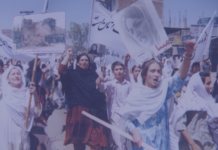Get the full interview by becoming a supporter on our Patreon!
We must recognize that “pleasure is a measure of freedom,” that’s the first ambition writer, healer, and teacher adrienne maree brown has for her book and guide, “Pleasure Activism: The Politics of Feeling Good.” In our movements and communities, we’re constantly trying to find ways to measure liberation and freedom, and love seems like as good a yardstick as any.

What would it look like to love without fear, to practive pleasure activism? adrienne has joined us on the show before to discuss organizing as science fiction and the work of Octavia Butler. In this interview, she speaks with us from Bluestockings, a feminist bookstore in New York City about the legacies of the erotic — from Octavia Butler to Audre Lorde and what it means to not just survive, but to seek and find pleasure. Like adrienne, the book is wildly popular and out now from AK Press.
adrienne:
There’s an us before the wound, there’s an us before oppression. To me, pleasure is a way that we tap down into that. I’m like, “When I’m having an orgasm, I’m not like, slavery!” You know, I’m like, “You might be my slave, but …” You know, in a good way. It’s really about, “Oh, I feel very free.” To me, the work was about, how do we remind people that you were free to begin with. You were always free to begin with.
For me I was like, how could I bring the best feeling when it’s like the best high, or the best mushroom, you know when you’re on … Have you maybe done mushrooms? All right, everybody else just get to it. All right? Life is short. Life is short. And they’re natural, okay? It’s good.
My name is adrienne maree brown. I am the author of Pleasure Activism: The Politics of Feeling Good. Right now, we are sitting in Bluestockings Bookstore, which is forever, I used to live in New York, I lived here for 10 years, Bluestockings has always been a beloved bookstore for me. So I’m really excited to get to be here tonight. We’re doing our New York premier event for Pleasure Activism.
We have been raised to fear the yes within ourselves, our deepest cravings. But once recognized, those which do not enhance our future, lose their power, and can be altered. The fear of our desires keeps them suspect and indiscriminately powerful. For to suppress any truth is to give it strength beyond endurance.
Audre Lorde’s text, The Uses of the Erotic, is a foundational text for pleasure activism. And I feel like what she was saying to us, what she was teaching us so much was that, pleasure and the erotic, the awakening, the erotic awakening is a way that we actually reclaim our whole selves, our real selves, our true selves. And that once we have had that awakening, we will no longer settle for self-negation, will no longer settle for suffering as our way of life. As like, “Oh, this is just how it’s got to be because we’re Black women.” I started asking myself, “How did I unlearn pleasure? Or when did I unlearn pleasure?”
When I look back, it’s like, oh there’s an ancestral unlearning of pleasure, a way that Black women on this country have been trained to be in service with our bodies, rather to be in pleasure in our bodies. I realize that we’re not the only ones, that almost every human on Earth in some way has been disconnected from their natural relationship to the planet, from their natural relationship to themselves, from our natural relationships to each other. And that pleasure is one of the ways that we know, “Oh God, I’m in nature. Oh God, I’m with my lover. Oh God, I’m connected, I’m part of something, I belong, I’m safe.” Pleasure let’s us know all that, right? So for me I was just like, it’s actually a measure of freedom. It’s a way that we say, “I have decolonized. I have returned to myself. I have been healing.”
















